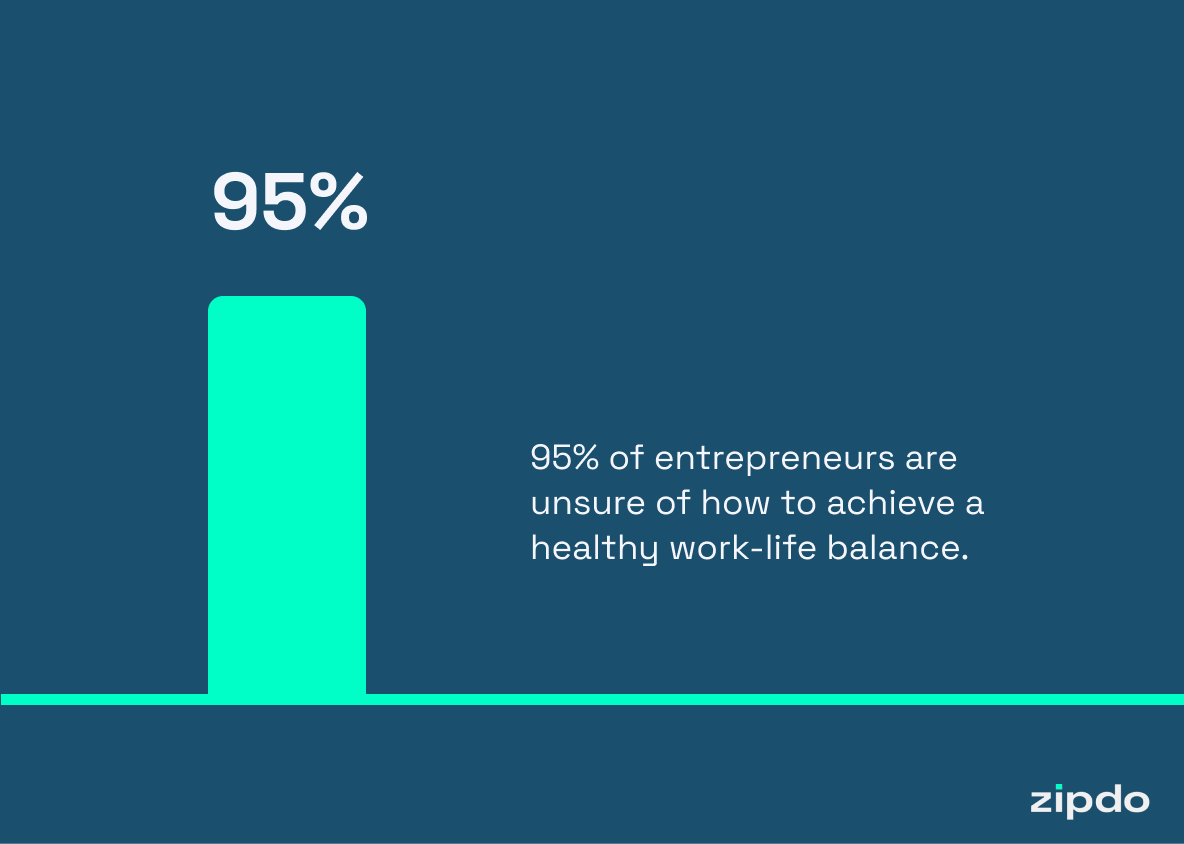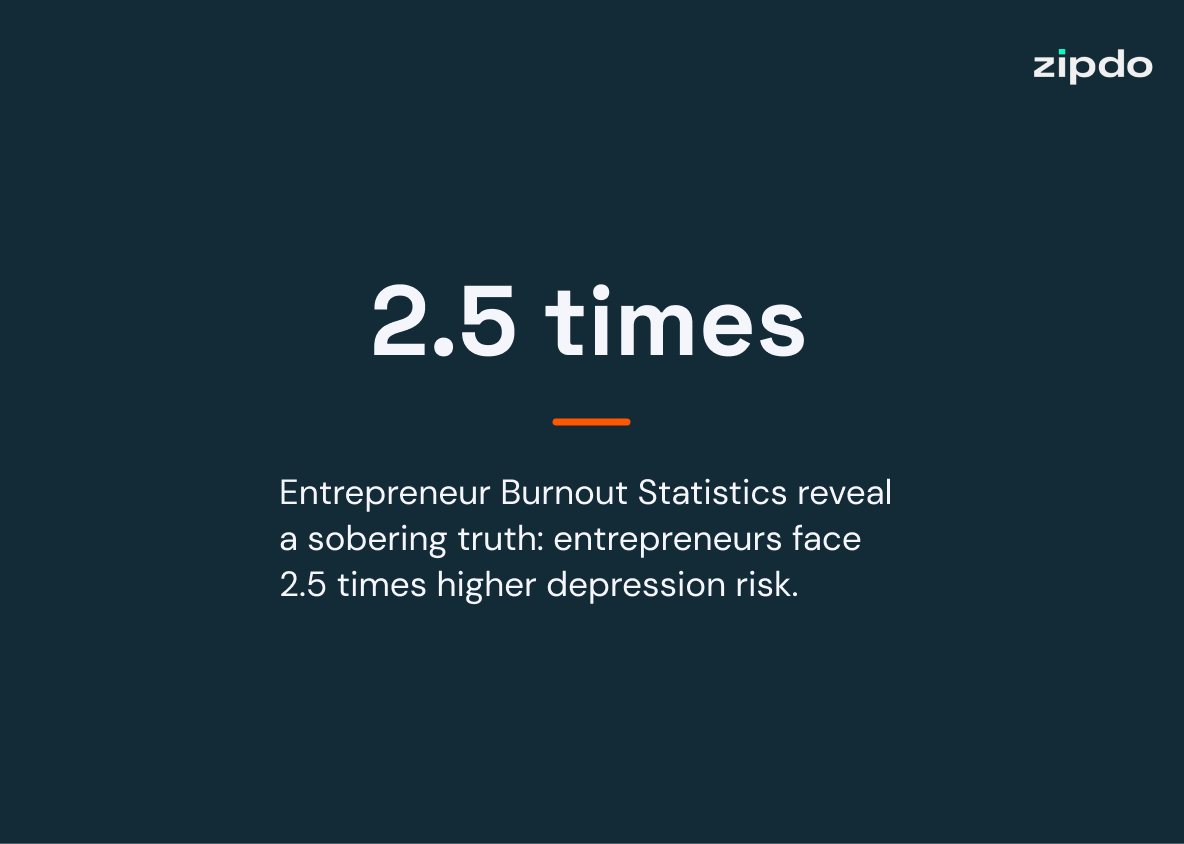The Impact of Burnout on Entrepreneurial Risk-Taking
Meet John, a tech entrepreneur working on a rapidly growing startup. Every day, he faces decisions that could pivot the direction of his company. There's the potential multi-million-dollar investment on the line, a bold product launch, and the relentless push for innovation. It's the thrilling, high-stakes world of tech entrepreneurship, where risks are as common as morning coffees.
But lately, John's coffee cups sit half-finished, cold. The decisions, once exhilarating, now feel like weights. He's tired, not just physically, but mentally. This fatigue isn't just from long hours; it's a deeper, more insidious kind of exhaustion. It's burnout, creeping in quietly, subtly altering his once sharp and daring decision-making prowess. Where John once saw opportunities, he now sees insurmountable challenges.
This change isn't just about personal feelings; it's about how your brain works. Science shows that burnout doesn't just make you tired; it changes the brain, affecting the abilities entrepreneurs like John need for taking risks and thinking of new ideas. But here's the thing: knowing this can make a big difference.
The Neuroscience of Burnout in Entrepreneurs
Let's take a step back and understand what we mean by 'burnout.' It's a term tossed around often, but what does it really entail?
At its core, burnout is a state of emotional, physical, and mental exhaustion.
It's like running a marathon with no finish line in sight. For entrepreneurs, constantly juggling the balls of innovation, management, and growth, this exhaustion isn't just about being tired. It's a depletion of energy, a dwindling of enthusiasm, and a decline in productivity, stemming from prolonged stress.
But here's where it gets interesting. Recent neuroscience has begun to peel back the layers of how burnout impacts the brain. It's like watching a highly skilled puppeteer suddenly struggling with the strings. Areas of the brain, such as the prefrontal cortex, which is crucial for decision-making, planning, and risk assessment, start to function differently under burnout.
This part of the brain is like the command center for entrepreneurs, helping them weigh pros and cons, forecast potential outcomes, and take calculated risks. When burnout hits, this command center starts to falter.
Studies have shown that chronic stress, a precursor to burnout, can lead to changes in brain structure and function.
The neural pathways involved in decision-making and risk assessment become less efficient. It's like a once swift and seamless internet connection that now buffers, disrupting the flow of information and decision-making processes. This alteration can lead to more conservative decision-making, or in some cases, erratic choices, as the brain's ability to evaluate risks becomes impaired.
Understanding this neuroscience isn't just academic; it's crucial for entrepreneurs. Recognizing the signs and taking steps to mitigate burnout can mean the difference between a flourishing business and a struggling one. It's about keeping the brain, the most vital tool in an entrepreneur's arsenal, in peak condition. And that's where strategies grounded in neuroscience, can make a real impact.
Statistics: Burnout and Its Impact on Business Decisions
The growing attention to burnout's impact on business decisions is concerning. Recent stats show how burnout affects entrepreneurs' choices.
A significant portion of entrepreneurs are grappling with high stress and burnout.
A startling 31% of business owners report experiencing elevated stress levels, while a considerable 20% work over 60 hours per week, heightening their risk of burnout.
This intense workload is not just a fleeting challenge; one in three entrepreneurs struggle with depression and burnout, showcasing the depth of the issue.
Remarkably, 30% of entrepreneurs admit to being often or constantly burned out, and 64% feel more stressed now than they were two years ago.
These figures underscore the critical need for addressing mental well-being in the entrepreneurial community.
The impact of burnout extends beyond personal health, affecting the very core of entrepreneurial decision-making. Studies have found that burnout can lead to more conservative or erratic decision-making, as the cognitive processes involved in evaluating risks and rewards become impaired.
This aligns with findings showing that only 33% of entrepreneurs take proper vacations to alleviate burnout, 29% experience long-term negative effects from it, and they are 2.5 times more likely to develop depression compared to other professionals. The majority of entrepreneurs, about 80%, feel overworked, increasing their susceptibility to burnout.
In terms of specific numbers, 8.4% of entrepreneurs reported experiencing burnout often or always as per a 2016 Gallup poll. Furthermore, 29% of small business owners report feeling constantly stressed by their work, and 41% of entrepreneurs report higher levels of anxiety, which is often a result of burnout.
Another alarming statistic is that only 13.5% of entrepreneurs felt they had a healthy work-life balance. This is further supported by a study indicating that 72% of entrepreneurs are directly or indirectly affected by mental health issues related to burnout. The prevalence of burnout among entrepreneurs is significantly higher than among general employees, with entrepreneurs 1.25 times more likely to report symptoms of burnout. Financial stress is also a major contributor, with 34% of entrepreneurs stating that finances are a top challenge in running their business.
These statistics highlight the critical importance of recognizing and addressing burnout among entrepreneurs. Not only does it affect their personal health, but it also has significant implications for their ability to make sound business decisions, potentially impacting the success and sustainability of their ventures.
Burnout and Risk-Taking: The Entrepreneur's Dilemma
In the tech world, risk-taking is often seen as a badge of honor. It's about bold moves, disruptive innovations, and making decisions on the fly.
But there's a paradox that's less talked about: the way burnout nudges entrepreneurs away from this risk-taking spirit.
Let's paint a picture. A tech founder, we'll call her Anna, starts with a vision. She's all about big ideas, willing to leap where others hesitate. Fast forward a few years, and her startup is gaining traction, but so is her stress level. Countless hours, relentless pressure, and the constant need to outdo competition start to take their toll. The burnout creeps in, and suddenly, Anna finds herself hesitating. The daring choices that once seemed second nature now feel daunting. She starts playing it safe, not because she wants to, but because burnout has dimmed her once-bright flame of risk appetite.
This isn't just Anna's story. It's a scenario playing out across the tech landscape. Consider another entrepreneur, let’s call him Ben. Ben's startup was known for its cutting-edge technology. But as burnout set in, he found himself shying away from innovative projects. The fear of failure, amplified by exhaustion, led him to opt for safer, less innovative paths. His company's growth slowed, and with it, so did his passion.
These stories are backed by research.
Studies have shown that burnout can significantly affect cognitive functions like creativity, problem-solving, and risk assessment.
Entrepreneurs, known for their high-stress environments, are particularly susceptible. When burnout hits, it doesn't just cause fatigue or disinterest. It can alter the very decision-making fabric that defines an entrepreneur's role.
But it's not all doom and gloom. Understanding this dilemma is the first step in addressing it. By recognizing the signs of burnout and its impact on their decision-making, entrepreneurs can take proactive steps to manage stress and maintain their innate ability to take calculated risks. It's about striking a balance - fueling the drive for innovation while keeping the flames of burnout at bay.
The key takeaway? Risk-taking is essential in the tech world, but so is the well-being of the entrepreneurs behind the ventures.
Navigating this tightrope between innovation and personal health is what can set apart successful tech leaders in today's fast-paced, high-pressure environment.
My Approach to Sustainable Peak Performance
Managing burnout is crucial for maintaining a healthy appetite for risk-taking. This is where my unique approach comes into play. Integrating the latest insights from neuroscience, I offer coaching methods specifically tailored to combat burnout and foster sustainable peak performance in entrepreneurs.
My approach goes beyond traditional stress management techniques. It's grounded in understanding how the brain functions under stress and the neurological impacts of burnout. By applying this knowledge, I help entrepreneurs recalibrate their mental processes, enhancing their ability to make sound decisions even in high-pressure situations. My methods are not just about coping with stress; they're about transforming the way entrepreneurs interact with it.
For tech entrepreneurs, who are constantly at the crossroads of high-stakes decisions, my coaching could be a game-changer. Strategies I use are designed to maintain cognitive agility and preserve the innovative mindset that's essential in the tech industry. By working with me, entrepreneurs can learn to navigate the challenges of their high-intensity work environments without sacrificing their well-being or their innate ability to take calculated risks.
In essence, my coaching methods offer more than just burnout relief. They provide a pathway to achieving and maintaining peak performance in a way that's both mentally sustainable and conducive to the entrepreneurial spirit of risk-taking and innovation.
Strategies to Mitigate Burnout's Impact on Decision-Making
Combatting burnout isn't just about taking a break; it's about strategic, neuroscience-backed approaches to rejuvenate the brain and enhance decision-making capabilities. Here are practical, actionable strategies for entrepreneurs:
Regular Physical Activity: Exercise is a powerhouse for the brain. It boosts blood flow, enhances cognitive functions, and releases endorphins, the body's natural stress relievers. Even a 30-minute walk each day can make a significant difference.
Mindfulness and Meditation: These practices help in rewiring the brain's response to stress. Regular mindfulness or meditation can increase the density of gray matter in brain regions associated with self-awareness, compassion, and introspection.
Adequate Sleep: Never underestimate the power of a good night's sleep. Sleep helps in memory consolidation, problem-solving, and emotional regulation – all crucial for effective decision-making.
Structured Time Management: Allocate specific times for work and rest. This structure helps prevent overworking and ensures time for relaxation and personal interests, which is essential for mental rejuvenation.
Healthy Nutrition: A balanced diet supports cognitive function. Foods rich in omega-3 fatty acids, antioxidants, and vitamins are particularly beneficial for brain health.
Setting Realistic Goals: Unrealistic expectations can lead to constant feelings of failure and burnout. Set achievable goals and celebrate small wins to maintain motivation and a positive outlook.
Delegation and Trust: No one can do it all. Delegating tasks to trusted team members can reduce workload and stress, allowing entrepreneurs to focus on key decision-making areas.
Social Support and Networking: Engaging with peers can provide fresh perspectives, reduce feelings of isolation, and offer valuable advice for managing challenges.
Professional Assistance: Sometimes, the best strategy is to seek help from a coach or therapist. Professionals like Sana Ross can provide tailored advice and strategies based on individual needs and situations.
Regular Breaks and Vacations: Taking time off is not a luxury; it's a necessity for long-term cognitive health and decision-making abilities. Regular breaks and vacations help to reset the brain and reduce burnout.
By integrating these strategies into daily routines, tech entrepreneurs can manage burnout and maintain the cognitive agility required for effective risk-taking and decision-making in the fast-paced tech industry.
Burnout emerges not just as a personal challenge, but as a pivotal factor influencing the essence of entrepreneurial success: risk-taking.
As we've seen, the journey from a spark of innovation to a flame of burnout can be alarmingly short. The statistics and stories we've delved into paint a clear picture: burnout is not just an individual health issue; it's a business concern with tangible impacts on decision-making and risk assessment.
Understanding and addressing burnout is, therefore, not a luxury but a necessity for maintaining a healthy risk-taking ability. It's about recognizing the signs early, taking proactive measures to manage stress, and integrating work-life balance as a non-negotiable part of the entrepreneurial journey.
By doing so, entrepreneurs can safeguard not only their mental and physical well-being but also the innovative spirit and daring decision-making that drive tech ventures forward.


















